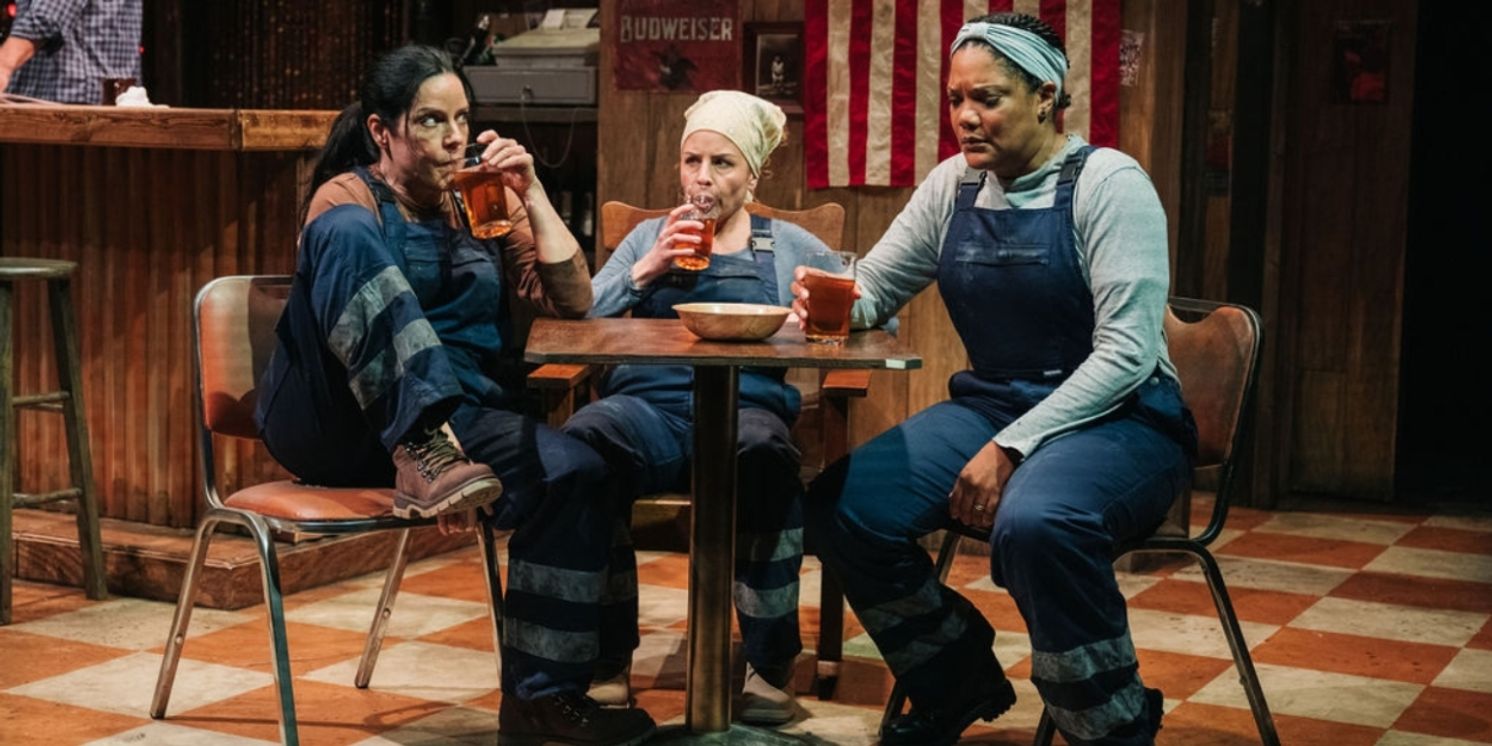
No matter what year an audience sees Lynn Nottage's (her second Pulitzer) Sweat, something will be going wrong someplace for some part of the American workforce. Nottage's play is set between 2000 and 2008 and tracks trouble and life at some fictional factories in actual Reading, PA during a time when NAFTA devastated many a union worker's career. In 2023, maybe worker stress comes from pandemic recovery or worry about robots replacing humans. But Nottage's masterful study of what these sorts of complicated messes do to very real people is timeless, brilliant, moving, and being very well rendered by Keegan as the final show in its 26th season.
Tautly directed by Angelisa Gillyard, Nottage's play crosscuts between 2008 and 2000 as it unspools the detailed story of eight people who relied on steady employment at their town's factories for life, liberty, and the pursuit of happiness. When the owners kneecap their lives with profit-making changes, jobs, but also friendships, families, and futures become altered forever. Audience members who know from unions will identify, and white-collar workers will learn. HR doesn't exist in this world. Nottage has cleverly created news flashes aired on a Reading radio station to keep the audience clear on whether each ensuing scene takes place in '08 or '00; and the broadcasts also offer background on the events of and leading up to those years--Clinton and NAFTA (North American Free Trade Agreement), Bush, Iraq, the stock market crash in 2008--each event important to the characters who are African-American, Hispanic, White, challenged by the usual substances, economics, and the devolving labor situation. So: timeless, brilliant, moving, and engrossing.
Matthew J. Keenan's design for the blue collar bar where Sweat takes place gloriously nails a familiar space, complete with an alley stage right and a painted view of sky and smokestacks high on a cyc behind. (Been seeing sets in this house since the un-airconditioned late 1960s: best. set. ever in the Church Street Theatre.) Cindy Landrum Jacobs (Properties/Set Dressing Designer) has populated the place with old bar stools and bottles of booze, lighted beer signs and grotty tables and chairs. Even the rag with which Oscar, the busboy, wipes them down is suitably grubby. (Keep your eye on Andrès F. Roa as Oscar; his performance crescendos.) Johnna Presby's costumes appropriately look like what these folks would naturally wear, not costumes. Alberto Segarra's lighting design for the alley has that harsh, too-bright quality alleys ought to have if they're safe and warm lights in the bar proper which the characters use as a meeting room, community center, home away from home, and, of course, their local; his upstage lights beautifully complement Keenan's sky at all times of day. Ian Vespermann's sound design servicably offers music between scenes and a slightly implausible static-free AM radio station. The distracting sound cue in a crucial late-play scene marks either his or director Gillyard's sudden lost awareness of how well-written and acted Sweat is; attentive audiences don't require melodramatic, loud, sudden noise to underline a plot's significant moment. It was an unfortunate spoiler at the climax of a near-perfect production.
The work of Keegan's nine-actor ensemble is so outstanding that it is difficult to single anyone out. Deimoni Brewington's Evan, the only character who doesn't work at the mill, has to coax then bully, nurture then initiate behavior modification in two angry young men, and he excels in the small role and also serves as Fight Captain with Sierra Young (Fight and Intimacy Director) which Sweat significantly requires. As those two guys, Bowen Fox and Jamil Joseph brilliantly reveal their characters, Jason and Chris respectively, who are almost unrecognizably different in 2008 from how they were in 2000; Fox and Joseph diligently execute these switches several times in each act during the 2 hour 25 minute production. Jon Townson, as Stan the bartender, will break your heart twice; Stan used to be in the union and work at the plant. He's Everybartender for the characters for almost all of Sweat. DeJeanette Horne's dynamic work as Brucie seesaws between the near incoherence that substance abuse causes and the absolute clarity induced by parenthood. And Santina Maiolatesi, Lolita Marie, and Susan Marie Rhea just impeccably depict Jessie, Cynthia, and Tracey, three besties who work together at the plant and celebrate birthdays together at the bar with Stan until the plot thickens. Nottage gives the ladies arias and ensemble pieces and gives the audience details and details of details--of inner life and past life, of hope for the future, and of loss. Brilliant, moving, engrossing, unforgettable. Sweat, which ought to be seen, runs through September 16.
(photo by Cameron Whitman)
Reader Reviews
Videos

